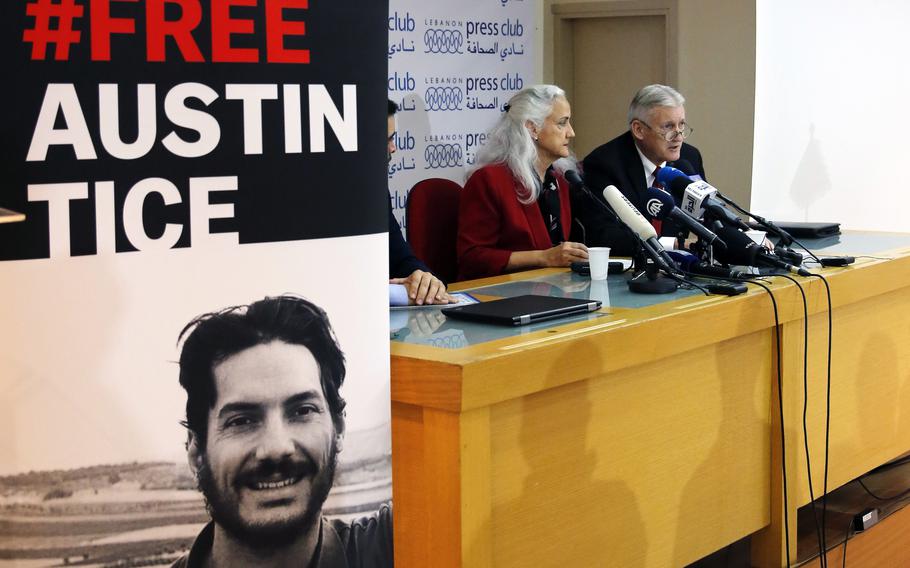
Marc and Debra Tice, the parents of Austin Tice, speak during a press conference in Beirut, Lebanon, in December 2018. (Bilal Hussein/AP)
The U.S. government had specific knowledge of the whereabouts of journalist Austin Tice, who went missing in Syria in 2012, for more than a decade, his mother said on Thursday, suggesting that more could have been done to recover the former Marine than was achieved under three administrations.
Debra Tice said her conclusion — including her belief that Austin Tice’s location was known up to the time of former Syrian president Bashar al-Assad’s ouster late last year — was based on extensive intelligence records the Trump administration recently permitted her to access. She said the effort to find her son was now much more difficult because, she believed, he had been moved around the time of the Assad regime’s sudden collapse at the hands of rebel forces.
“The effort to find him is now a real challenge, because for 12½ years, our government knew exactly where Austin was, and we had an opportunity to bring him home,” she said in remarks at the National Press Club ahead of World Press Freedom Day on May 3.
“I can tell you that finding so much truth after so much untruth was exceedingly painful,” Debra Tice said in a conversation with The Washington Post executive editor Matt Murray.
Austin Tice was a freelance writer contributing coverage of Syria’s civil war to outlets including The Post when he was abducted on Aug. 14, 2012, at age 31. On the 10th anniversary of his abduction in 2022, the Biden administration said it had certainty he was being held by the Syrian regime, a claim Damascus denied.
Numerous U.S. officials have said that the years-long effort to find and recover Tice never yielded reliable information about his location. Only fleeting evidence of his status emerged early in his captivity. One former official with knowledge of his case, who like other officials spoke on the condition of anonymity to address a sensitive diplomatic and intelligence effort, said the U.S. government had not been able to credibly determine Tice’s whereabouts for at least a decade.
Hope surged following Assad’s sudden flight to Russia last year, after which thousands of detainees began to pour out of regime prisons, and U.S. officials hoped Tice might be tracked down. In December, President Joe Biden reiterated his administration’s belief that Tice was still alive and vowed his recovery was a top priority as Washington responded to the dramatic events in Syria.
Biden’s hostage envoy traveled to Damascus that same month, and Syria’s new government — headed by the former Islamist militant leader Ahmed al-Sharaa — offered to help, but so far no conclusive information on his whereabouts has surfaced. Debra Tice held talks with Sharaa during a visit to Damascus in January.
President Donald Trump meanwhile has said the search would continue during his second term.
“There’s been virtually no sign … of Austin,” Trump said in March. “You know, a lot of bad things happen, but … until we find out something definitive one way or the other, we will never stop looking for him.’’
According to people familiar with the matter, the CIA recently updated its assessment on Tice’s status from low confidence that he was alive to low confidence that he was deceased.
Debra Tice said she hoped Trump would intensify efforts to partner with U.S. allies in the Middle East that might be able to help locate and bring home her son, who she maintains is still alive.
She said the prison where her son was held before Assad’s ouster “was known” to at least some in the U.S. government, but suggested the information may not have been shared effectively.
Karen DeYoung contributed to this report.